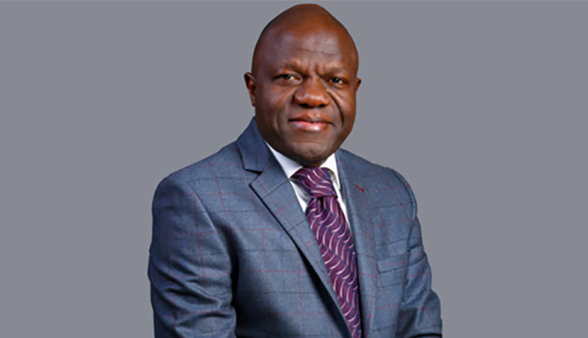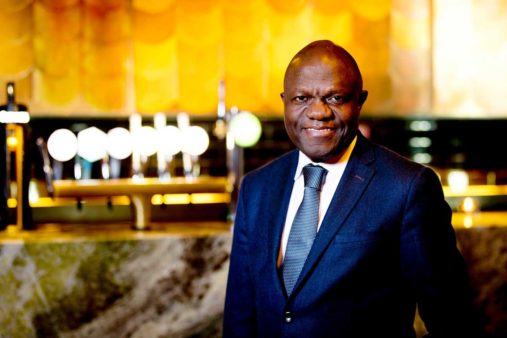Pepsi Kenya Appoints Ex-Diageo’s Baker Magunda to Lead Onslaught Against Coca-Cola
Pepsi Kenya Appoints Ex-Diageo’s Baker Magunda to Lead Onslaught Against Coca-ColaVeteran FMCG executive Baker Magunda takes the helm at Pepsi Kenya, bringing decades of beverage industry leadership to steer the company’s next phase of growth amid intensifying competition and Coca-Cola’s $175 million reinvestment plan.
SBC Kenya Ltd, the official bottler of PepsiCo beverages in Kenya, has appointed veteran FMCG executive Baker Magunda as its new Chief Executive Officer. The appointment comes as the company intensifies its efforts to expand market share and strengthen its competitive position in Kenya’s carbonated soft drinks segment.
According to our trusted news sources, the appointment took effect in August 2025.
Magunda replaces Paddy Muramiirah, who retired last year. Muramiirah, who previously served as CEO of Crown Beverages Uganda, had been leading Pepsi’s entry into the Kenyan market since Crown Beverages (Mauritius) Ltd acquired Kenya Bottling Company Ltd—the parent company of SBC Kenya—in January 2024.
A Proven Track Record in Beverages Across Africa
Baker Magunda brings with him more than two decades of extensive experience in the beverage industry, having built a distinguished 23-year career at Diageo, one of the world’s leading beverage companies. Throughout his time at Diageo, he held multiple senior leadership positions across East, West, and Central Africa, demonstrating both strategic acumen and operational excellence in diverse and complex markets.
His leadership journey began in Uganda, where he served as Managing Director of Uganda Breweries Limited from 2006 to 2008. He was then appointed Managing Director of Kenya Breweries Limited, a role he held from 2008 to 2012, during which he led significant market and route-to-consumer transformations within the East African region.
In 2012, Magunda moved to Central Africa to take on the role of Chairman and Managing Director of Guinness Cameroon, where he provided strategic direction and governance oversight until 2016. His next assignment was in West Africa, where he became the Managing Director and Chief Executive Officer of Guinness Nigeria in 2018. Over his four-year tenure in Nigeria, he led the business through a turnaround phase, culminating in a substantial rebound in profitability and commercial performance before retiring from the company in 2022.
At Guinness Nigeria, Magunda is credited with overseeing a strong recovery during the COVID-19 period, leading to a 1147% increase in profit after tax in 2022, alongside double-digit revenue growth.
Earlier in his career, Magunda also worked with Coca-Cola Sabco’s Century Bottling Company in Uganda as Market Development Manager (1996–1999), giving him valuable cross-brand exposure and deep insights into East Africa’s beverage consumption patterns. This was further reinforced during his four-year tenure as Managing Director of Kenya Breweries Ltd (2008–2012), where he led marketing, distribution, and route-to-market initiatives, giving him direct experience and operational familiarity with the Kenyan beverage landscape.
Leadership Continuity and a Strengthened Strategy
Magunda steps into a role previously held by Paddy Muramiirah, who led Crown Beverages Uganda from 2016 to 2023. During that period, Muramiirah oversaw a transformational growth phase in Uganda—growing revenues from UGX 228.7 billion in 2016 to UGX 646.3 billion, and leading the company through a $90 million plant expansion with financing from Stanbic Uganda and Citi, and won multiple global accolades from PepsiCo. He later moved to Kenya to support the regional expansion strategy before retiring.
His successor, Baker Magunda, is expected to build on this momentum and deepen Pepsi Kenya’s strategic focus on market development, brand competitiveness, and operational excellence.
Competitive Landscape: A Brewing Cola War
As of 2023, according to the Competition Authority of Kenya, SBC Kenya controlled 1.5% of the carbonated soft drinks market in Kenya, while Coca-Cola held a dominant 93.9%, and Highlands trailed with around 3.6%. Although recent market activity suggests that Pepsi’s share has since improved following new leadership, ownership, and brand positioning.
Coca-Cola, too, is not sitting idle. In May 2024, the Coca-Cola system in Kenya—comprising The Coca-Cola Company and Coca-Cola Beverages Africa (CCBA)—announced a planned investment of up to $175 million over five years, contingent on meeting growth targets.
“This investment is aimed at accelerating the Coca-Cola system’s capacity and capability expansion over the next five years. Our decision to invest underscores our belief in the long-term potential of Kenya’s economy,” said Sunil Gupta, CEO of Coca-Cola Beverages Africa, told the Kenyan President H.E. Dr William Ruto during his May 2024 visit to the Coca‐Cola Company headquarters in Atlanta, US. “The Coca‐Cola system has been an integral part of Kenya’s landscape for more than 75 years. Today, we are excited to announce our intention to strengthen this legacy through a substantial investment,’ Sunil added.
This capital injection and strategic expansion signal Coca-Cola’s intent to defend its turf, even as Pepsi positions itself for growth through operational revamps, retail partnerships, and pricing strategy.
Outlook: Growing the Pepsi Footprint
Pepsi’s growth ambition in Kenya is part of a long-term strategy to increase the brand’s market penetration, particularly through improved production capabilities via SBC Kenya’s Nairobi plant, strategic partnerships with retail and hospitality networks and intensified brand positioning and distribution alignment.
The appointment of Baker Magunda signals the company’s focus on leveraging seasoned leadership and financial strength to gain ground in a market long dominated by Coca-Cola.
While Pepsi still faces a steep climb, especially in terms of consumer switching behaviour, the combination of proven leadership, expanded production, and strategic capital gives SBC Kenya a solid platform from which to grow.
With the transition from Paddy Muramiirah to Baker Magunda now complete, SBC Kenya enters a new chapter in its growth journey. Backed by Ugandan shareholders and regional financial partners, and led by a veteran of Africa’s beverage industry, Pepsi Kenya is repositioning itself not just to participate—but to compete.
As we head into 2026, all eyes will be on how Magunda steers the company toward higher market share, stronger brand equity, and sustainable growth.
About SBC Kenya (Pepsi Kenya)
SBC Kenya Ltd is the authorised bottler of PepsiCo beverages in Kenya. The company operates a state-of-the-art production facility in Nairobi and distributes a wide range of non-alcoholic ready-to-drink beverages across the country. Its product portfolio includes Pepsi, 7UP, Mirinda, Mountain Dew, Sting energy drink, Aquafina water, and Evervess tonic water.
Previously operating as a subsidiary of Kenya Bottling Company Ltd, SBC Kenya was acquired in early 2024 by Crown Beverages (Mauritius) Ltd, an investment vehicle owned by the shareholders of Crown Beverages Uganda. This acquisition marked Pepsi’s renewed commitment to the Kenyan market, supported by financing from Stanbic Uganda.
Share this content:

 Q&A𑗅Peter Magona: The Pharmacist-Turned-Strategist Dispensing Kick-ass Campaigns
Q&A𑗅Peter Magona: The Pharmacist-Turned-Strategist Dispensing Kick-ass Campaigns







Post Comment